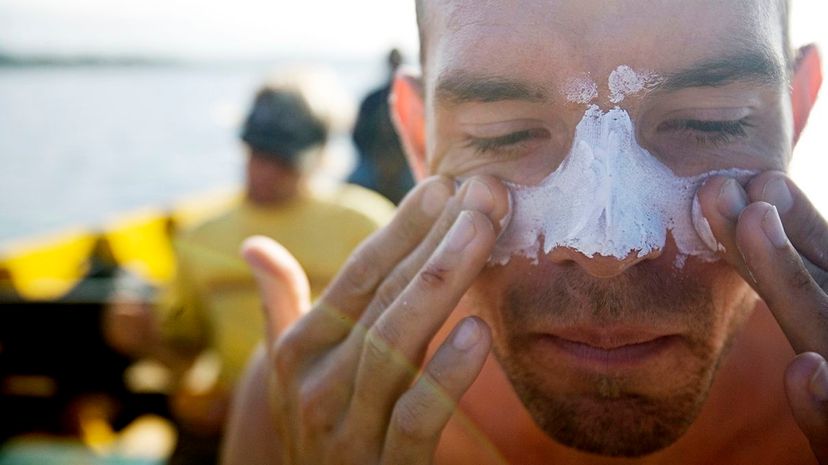 “The ideal, recommended application of sunscreen every few hours butts up against the reality of how and when people actually use it. Aaron Black/Getty Images
“The ideal, recommended application of sunscreen every few hours butts up against the reality of how and when people actually use it. Aaron Black/Getty Images
Sunburns are the worst. You go to the beach, you have a nice day splashing around in the waves, thinking you’re getting all bronzed like a gorgeous Hawaiian surfer — but then you arrive home to find you actually look like a lasagna, and have to sit in an ice bath for two days and then die of skin cancer later. It might have been worth it. It’s hard to say.
But some people are pretty careful about following instructions and reapplying sunscreen every hour, even when it’s sandy and wet and a total hassle. These people are smart and responsible and should be rewarded with a sunscreen that protects their beautiful, delicate skin from harmful solar radiation without having to reapply every 40 to 80 minutes as directed. It seems like they’ve earned it.
That’s why scientists are trying to the bottom of exactly why sunscreens work — so they can develop one that will last longer. A research group from the University of Warwick recently presented their findings at the National Meeting & Exposition of the American Chemical Society (ACS).
"Sunscreens have been around for decades, so you’d think we know all there is to know about them — but we really don’t," said Vasilios Stavros, associate professor of physical chemistry at the University of Warwick, in a press release. "If we better understand how the molecules in sunscreen absorb light, then we can manipulate the molecules to absorb more energy, and we can protect the molecules from degradation. If the molecule doesn’t break down, there’s no need to reapply."
The team deconstructed the ingredients found in a standard bottle of sunscreen from the drugstore to figure out how the component ingredients in sunscreens actually work. They started with the obvious ones: the "chemical filters," whose molecules do the work of absorbing UV light and releasing the absorbed energy as heat. Of the 10 chemical filters studied by the research team, they found several of them are prone to absorbing energy and instead of entering a more excited electronic state and releasing the energy as heat, the molecules just end up staying in the excited state or just breaking apart, releasing free radicals. That’s not what you want when you’re trying to protect your skin.
In order to figure out how to keep these chemical filters from going on the fritz, Stavros’ team tested how well common chemical filters like oxybenzone moved in and out of excited states when shot with lasers meant to simulate the energy from the sun. It turns out that the oxybenzone the team tested got stuck in an excited state 10 percent of the time after having lasers shot at it. And now that they’ve figured this out, researchers hope they can mitigate sunburn by improving sunscreens.
"When that chemical filter is in an excited state, its atoms are rotating around certain bonds," Stavros said. "If we can manipulate this rotation by adding different chemical groups, we could help the molecule find its way back to the ground state."
Soon, hopefully, all this chemical filter research will result in us some longer-lasting sunscreens, which will make all beach trips more relaxing and less likely to end in burns, blisters, peeling and pain.
Now That’s Interesting
The first synthetic sunscreen was invented in 1938 by chemistry student and mountain climbing buff Franz Greiter, who was tired of getting savagely burned while on mountaineering expeditions.



























